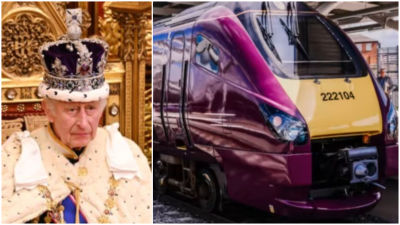King's Speech: Derby-based 'Great British Railways' promised in draft bill

A draft Bill to create a new public sector body to overhaul Britain’s railways, headquartered in Derby, was included in the King’s Speech today.
This could bring much-needed jobs to Derby, after the city's Alstom train factory - which had been building trains for HS2 - faces uncertainty after Rishi Sunak announced that its northern leg would be scrapped.
2,000 people are employed at Alstom's Litchurch Lane Works in the city - but nearly all of them could lose their jobs by the end of the 2023, according to reports.
And further employment uncertainty in Derby surged when engineering giant Rolls-Royce, based in the city, announced that 2,500 jobs would be scrapped globally as part of efforts to "streamline" the business.
The Derby headquarters for GBR was announced in March 2023 by Transport Secretary Mark Harper.
The East Midlands city fought off competition, winning a public vote and beating six other locations, such as Birmingham, Crewe, Doncaster, Newcastle and York.
At the time, Department for Transport said: "Derby came top of all six excellent locations in both the rigorous assessment process and the public vote.
"Their application demonstrated strong links to the wider network, well-established connections with the industry, supply chain and customers, as well as an extensive local cluster of private sector rail businesses."
But there has been speculation that the plan would be dropped.
There were concerns within the industry that Great British Railways (GBR) would not be established, given it has been two-and-a-half years since it was first proposed by then transport secretary Grant Shapps.
The government says its draft Rail Reform Bill will enable GBR to be formed, to carry out functions such as awarding operating contracts to train companies and managing rail infrastructure.
It argues the draft Bill must be scrutinised by parliamentarians and industry experts due to the scale and complexity of the changes being made.
It also insists benefits for passengers are introduced without the need for primary legislation, such as simplifying fares and more pay-as-you-go ticketing.
Being in draft form means it is unlikely it'll be passed in this parliamentary session, or before the next general election, which is expected to take place next year.
Richard Bowker, former boss of the Strategic Rail Authority, which was a public body providing strategic direction for the industry between 2001 and 2005, said he does not understand why major reforms are taking so long to be delivered.
He said: "I am genuinely struggling to see why it is so complex that, two and a half years since the Williams-Shapps plan was announced, we’re still only at this point.
"Anything that moves us towards a world where government officials have less to do with the day-to-day running things is good news, but why so slow?
"Time is really of the essence. What have you been doing for two and a half years?"
The creation of GBR was announced by then-transport secretary Grant Shapps in a White Paper in May 2021.
The Williams-Shapps Plan for Rail was based on the recommendations of a review carried out by former British Airways chief executive Keith Williams, which was established in September 2018.
Rail services have recently been disrupted by members of the Rail, Maritime and Transport (RMT) Union at 14 train companies going on strike in a long-running dispute over pay, jobs and conditions.
Want a quick and expert briefing on the biggest news stories? Listen to our latest podcasts to find out What You Need To Know...